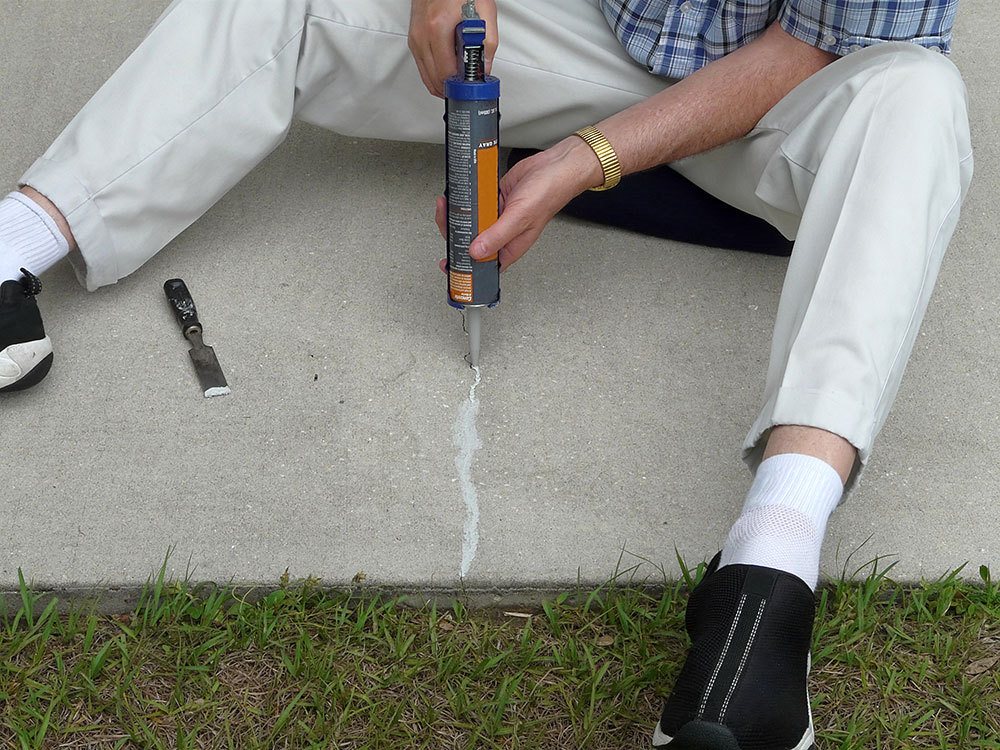It’s easy to take concrete patios, sidewalks, driveways, and garage floors for granted. You walk or drive all over them, so they seem pretty invincible. Like a weightlifter who stops working out, a concrete surface that isn’t properly maintained can deteriorate over a long period of time. If you combine that with the fact that concrete isn’t cheap, it would be in your best interests to protect it from unnecessary deterioration.

Here are some important tips on how you can keep your concrete surface maintained.
#1: Apply a Protective Sealant
A concrete surface should always be coated with a protective sealant to keep moisture from compromising its integrity. It will also make the surface more resistant to stains. For newly-poured concrete, experts don’t recommend applying a sealer until it has had enough time to completely cure (which takes 28 days). There are two types of concrete sealers: acrylic-resin and penetrating. You will need to re-apply it on a regular basis.
Weather and how much traffic it receives will determine how often you need to reseal your concrete. In most cases, you will need to reapply acrylic-resin sealers every two years. Penetrating sealers can last 5-10 years. But no matter what type of sealer you use, doing it yourself is fairly easy. All you need is a reputable sealing product and a paint roller with a 3/4-inch nap. The cost of the sealer will depend on where you’re buying it from, but it’s usually about 15-25 cents per square foot.
#2: Clean it on a Regular Basis
Regular cleaning is an important step in maintaining concrete. Remove debris, leaves, and dirt with a broom or leaf blower. If you have more stubborn stains, consider using a pressure washer to clean the surface. Use a mild detergent or a special concrete cleaner to remove oil stains, grease marks, and any other stubborn spills. Avoid using any harsh chemicals or high-pressure settings, because they can damage the concrete surface.
#3: Avoid Using Deicing Chemicals
Experts recommend not using deicers on concrete, especially if it’s less than a year old. But it’s not the deicers that cause problems. It’s the increased number of freeze-thaw cycles that they cause. Deicing agents chemically lower the freezing temperature of water. As they work, they turn snow and ice into a brine solution (which keeps thawing and refreezing as the weather and temperature change). As a result, the concrete has to endure a lot more freeze/thaw cycles than it normally would. The solution will also migrate into the concrete, where it will freeze (expand) and thaw (contract). This continuous freeze/thaw cycle will cause more damage.
Deicers that contain ammonium nitrates and ammonium sulfates are even worse for concrete, because they attack it on a chemical level. Sodium chloride (rock salt) and calcium chloride won’t cause as much damage, but it’s harmful to vegetation. Using sand and scraping off ice will be a better alternative.
#4: Repair Cracks Immediately
Cracks on a concrete slab can compromise its integrity, so it can cause more damage if it’s left unattended. Check the concrete surface for cracks no matter how small they are, and immediately repair them with a concrete patching compound or crack filler. Clean the crack thoroughly by removing any debris or loose materials. Then, apply the filler according to the product instructions. Make sure it fills the entire crack and that it’s level with the surrounding surface. You should also smooth it out before giving it enough time to cure.
#5: Protect it Against Heavy Loads
Concrete is strong and durable, but it isn’t indestructible. So, you should avoid placing heavy objects or parking vehicles that exceed the concrete’s weight capacity. Too much weight on a concrete slab can cause it to crack, sink, or develop other types of structural damage. If you have heavier vehicles or equipment, you should think about adding some extra support (such as stepping stones or concrete pavers) to distribute the load more evenly.
#6: Deal with Stains as Soon as Possible
Accidental spills from oil, gasoline, or other chemicals can stain your concrete if you don’t take care of it promptly. As soon as a spill happens, you should soak it up with an absorbent material (such as kitty litter or sawdust). You should also avoid using abrasive cleaners, because it can damage the concrete surface. Use a mild detergent or a special concrete stain remover, but make sure you follow the manufacturer’s instructions. If you have any stubborn stains, you may need to repeat the process or seek the help of a professional.
If you’re looking for one of the best Corpus Christi concrete contractors, be sure to get in touch with Streem Foundation Repair.
